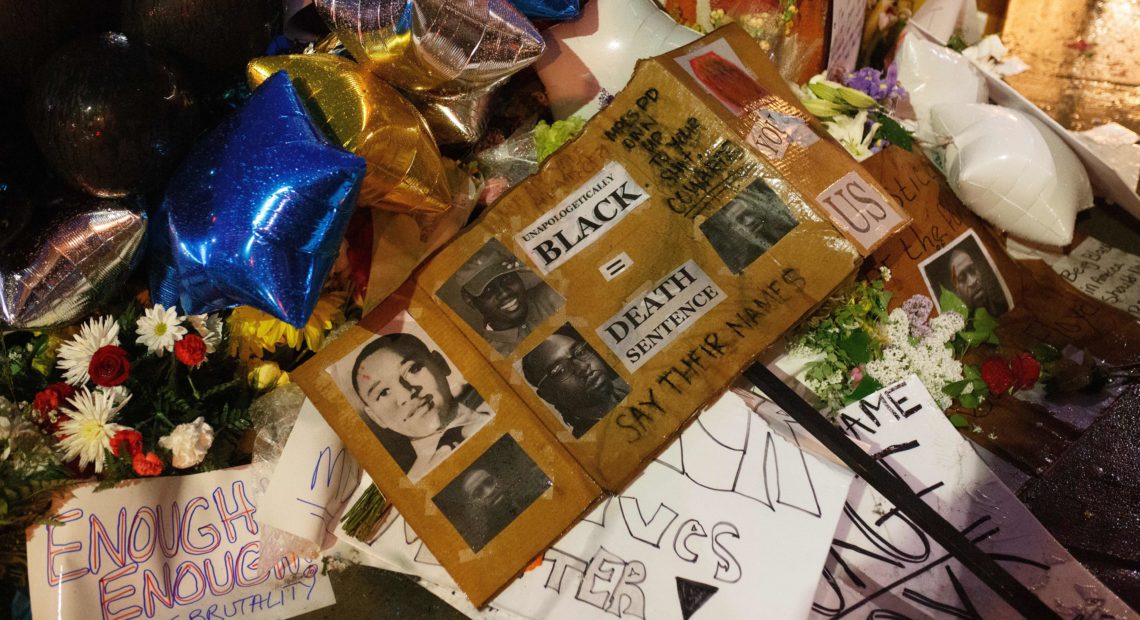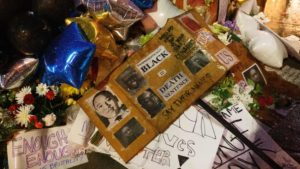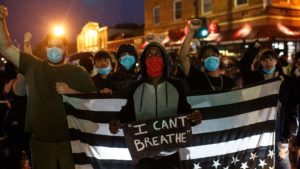
George Floyd’s Death Stokes Calls For Minneapolis Officers To Be Charged
BY COLIN DWYER
Just one day after the death of a black man whose arrest was recorded and posted on social media by a passerby, Minneapolis is grappling with the fallout that has spread beyond city limits.

A makeshift memorial, seen Tuesday, has grown near where George Floyd died while in the custody of Minneapolis police. Mourners have brought flowers, signs and balloons to the site in Floyd’s memory. CREDIT: Kerem Yucel/AFP via Getty Images
The disturbing video of Monday night’s death — during which a white officer’s knee was planted firmly on George Floyd’s neck and his desperate calls for help were ignored — has prompted protests in the Minnesota city and demands for charges for the officers involved.
At a news conference Wednesday, Minneapolis Mayor Jacob Frey called on Hennepin County Attorney Mike Freeman to “act on the evidence before him” and press charges on the arresting officer.
“Why is the man who killed George Floyd not in jail? If you had done it or I had done it, we would be behind bars right now. And I cannot come up with a good answer to that question,” Frey told a news conference Wednesday.
“We watched for five whole excruciating minutes as a white officer firmly pressed his knee into the neck of an unarmed, handcuffed black man,” he added, noting that the arresting officer was not practicing a technique condoned by the city’s police. “I saw no threat; I saw nothing that would signal that this kind of force was necessary.”
Frey refrained from specifying what charges he would like to see, citing a desire not to impede investigators. But Floyd’s sister Bridgett went one step further on national television earlier Wednesday.
“I would like for those officers to be charged with murder because that’s exactly what they did,” she told the Today show. “They murdered my brother; he was crying for help.”
She said the family, which has retained legal representation, is far from satisfied with the announcement that the four officers in the video have been fired — a swift decision that Frey said was “the right call.” The Minneapolis Police Department has not publicly confirmed the officers’ identities, and it said the FBI is also investigating the circumstances of Floyd’s death.
The announcement also failed to satisfy protesters who on Tuesday evening thronged to the department’s 3rd Precinct, where clashes erupted between demonstrators and law enforcement in riot gear. As Minnesota Public Radio reported, the demonstrators damaged the building and a squad car in a confrontation that eventually saw police firing tear gas into the crowd.
“What we witnessed today was state-sponsored murder, a state-sponsored execution,” Steven Belton, president of the nonprofit Urban League Twin Cities, said at a gathering of local civil rights leaders earlier Tuesday outside City Hall. “And what we await to see is whether it’s going to become state-sanctioned execution. It’ll be sanctioned if nothing is done.”
The controversy engulfing Minneapolis is not unfolding in a vacuum.
Already a video recorded earlier this year in Georgia — depicting the death of an unarmed black man, who was followed and shot by two white men while out for a jog three months ago — has renewed questions about the conduct of local police, who did not arrest the men until after the video surfaced this month.
And this week, a recorded encounter in New York City’s Central Park caught fire after it was posted to social media. In the video, a white woman calls the police on a black man, who says he had simply asked her to leash her dog while he was out bird-watching.
“He’s recording me and threatening me and my dog,” she tells emergency operators multiple times as the man recording her keeps his distance.
After the video surfaced, the woman was fired by her employer, the investment firm Franklin Templeton.
The video recorded in Minneapolis more closely called to mind an earlier death in New York City, however. Like Eric Garner, who died after an officer’s chokehold in 2014, Floyd’s final words before he appeared to lose consciousness were a plea for help: “I can’t breathe.”

Protesters gather Tuesday near where Floyd died in police custody in Minneapolis. One of them displays Floyd’s final words, recalling those made famous by Eric Garner when he died in 2014 in New York City. CREDIT: Kerem Yucel/AFP via Getty Images
Floyd is seen wailing the phrase several times with his face planted on the pavement, his hands apparently cuffed behind his back and a male officer kneeling on his neck. Observers standing nearby are heard telling officers that Floyd’s nose was bleeding and that he was dying. The officer and his colleagues show little reaction as the man gradually goes silent.
The officer does not lift his weight off Floyd’s neck throughout most of the video until medical workers arrive to lift him into an ambulance on a stretcher.
The New York City police officer who used the chokehold on Garner, Daniel Pantaleo, was never charged with a crime but was fired last year on a judge’s recommendation.
The Floyd family’s attorney emphasized the link with Garner in comments Wednesday to the Today show.
“It’s worse than Eric Garner in many ways,” civil rights attorney Benjamin Crump said, “because you hear the people even pleading with them, ‘Please get your knee off his neck. Have some humanity; this is a human being,’ ”
U.S. Sen. Amy Klobuchar of Minnesota said in a statement Tuesday, “There must be a complete and thorough outside investigation into what occurred, and those involved in this incident must be held accountable. Justice must be served for this man and his family, justice must be served for our community, and justice must be served for our country.”















